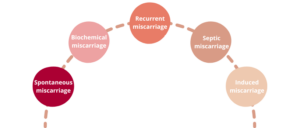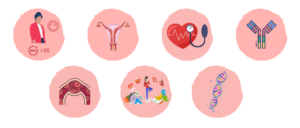What is a Miscarriage?
Medically, a miscarriage is the loss of pregnancy before the fetus is viable outside the womb. This process can occur at various stages of pregnancy and may result from multiple factors, both biological and external. Understanding the causes and possible solutions is essential to improving the chances of achieving a successful pregnancy in the future.
Types of Miscarriages and Common Causes

- Spontaneous Miscarriage: This is the most common type of miscarriage and occurs without medical intervention, usually in the first trimester. Common causes include chromosomal abnormalities in the embryo, often resulting from errors during cell division. Although it can be an emotionally challenging experience, it is important to know that spontaneous miscarriages are common and, in most cases, do not indicate an underlying health issue.
- Biochemical Miscarriage: This type of miscarriage occurs in the early weeks of pregnancy, before it can be detected via ultrasound. It is usually identified through hCG hormone tests, which initially show positive levels but then decline. A biochemical miscarriage may be due to genetic factors or issues with embryo implantation.
- Recurrent Miscarriage: A woman is considered to have experienced recurrent miscarriages when she has had three or more consecutive miscarriages. In such cases, it is crucial to conduct a thorough investigation to identify underlying causes. These causes may include genetic problems, uterine abnormalities, autoimmune diseases, or hormonal factors. At Gravida, we conduct personalized studies to detect potential risk factors and design tailored treatment plans.
- Septic Miscarriage: This less common type of miscarriage occurs when an infection in the uterus affects the pregnancy. Immediate medical attention is essential in these cases. In addition to bacterial infections, an imbalance in the uterine microbiota can also contribute to an unfavorable environment for pregnancy development.
- Induced Miscarriage: This is an intentionally induced miscarriage, either for medical or personal reasons. Induced miscarriages may be recommended in very specific situations, such as when severe abnormalities in the embryo are detected or there are significant health risks to the mother.
Risk Factors Associated with Miscarriages
Several risk factors can increase the likelihood of a miscarriage, some of which are controllable, while others are beyond our control. Common risk factors include:
- Maternal Age: After age 35, the risk of spontaneous miscarriage increases due to the higher likelihood of chromosomal abnormalities in eggs.
- Uterine Abnormalities: Issues such as a septate uterus or the presence of fibroids can hinder proper embryo implantation and development.
- Chronic Diseases: Conditions such as diabetes, hypertension, and autoimmune diseases can negatively impact pregnancy.
- Immunological Factors: Certain immune system alterations, such as specific KIR gene combinations or HLA-C haplotypes, can influence embryo receptivity and increase the risk of recurrent miscarriage. Immunological studies can help detect and manage these factors.
- Blood Clotting Disorders and Thrombophilias: Conditions affecting blood clotting, such as thrombophilia, can impede adequate blood flow to the uterus and placenta, increasing the risk of miscarriage. At Gravida, we conduct specific studies to identify these conditions and provide appropriate treatment.
- Lifestyle: Factors such as smoking, alcohol consumption, drug use, and a poor diet can also influence the likelihood of miscarriage.
- Genetic Factors: Some couples may have genetic predispositions that increase the risk of chromosomal abnormalities.

At Gravida, we evaluate these and other factors in patients to provide a comprehensive and personalized approach.
Approaches and Treatments in Assisted Reproduction
Assisted reproduction offers a range of solutions for those who have experienced miscarriages and seek to improve their chances of achieving a successful pregnancy. Common approaches include:
- Preimplantation Genetic Diagnosis (PGD): For patients with a history of miscarriage due to genetic factors, PGD allows the selection of embryos without chromosomal abnormalities before transfer. This increases the chances of a healthy pregnancy and reduces the risk of miscarriages.
- Hormonal and Metabolic Studies: Evaluating the patient’s hormonal levels and metabolic state can reveal imbalances that may be affecting the pregnancy. Based on the results, a personalized hormonal treatment can be designed.
- Autoimmune Factor Analysis: Autoimmune diseases can affect embryo implantation and development. In such cases, appropriate immunological treatment can be key to reducing the risk of miscarriage.
- Implantation Window Study: The implantation window is the period during which the endometrium is receptive to successful embryo implantation. This study, also known as ERA (Endometrial Receptivity Analysis), helps determine the optimal time for embryo transfer. In patients who have experienced miscarriages or implantation failures, adjusting the timing of transfer can significantly increase success rates.
- Uterine Microbiome Analysis: The composition of the uterine microbiome can influence embryo implantation and the development of a healthy pregnancy. An imbalance in the microbiota can increase the risk of implantation failures and miscarriages. By analyzing this microbiome, potential imbalances can be identified and treated, improving conditions for a successful pregnancy.
- KIR and HLA-C Studies in Parents or Donors: In cases of recurrent miscarriages or implantation difficulties, specific immunological studies in parents or donors, such as KIR gene and HLA-C haplotype analysis, can evaluate immunological compatibility and improve implantation conditions. At Gravida, these studies are offered when necessary to personalize treatment to the fullest.
- Emotional and Psychological Support: At Gravida, we understand that the emotional impact of a miscarriage can be overwhelming. We offer psychological support to our patients, helping them face the process with a network of specialized professionals.
Professional Support from Gravida
At Gravida, our team is committed to each patient, providing not only the necessary medical tools but also the support and understanding that this process requires. We know that miscarriage is a difficult experience and can generate doubts and fears about future pregnancy attempts. Therefore, we work closely with each individual to understand their situation and design a treatment plan that maximizes the chances of success.
Our clinic focuses on providing personalized care that integrates science with emotional support, ensuring that every step of the fertility process is guided by highly skilled professionals sensitive to the needs of our patients.
Conclusion
Miscarriage is a sensitive and complex topic in the field of assisted reproduction. At Gravida, we are here to help our patients understand the factors that can influence a successful pregnancy and overcome obstacles on their journey to motherhood. Whether through precise diagnostics, specialized treatments, or emotional support, our team is dedicated to providing the best possible care.
If you have questions or need more information on how Gravida can assist you in your fertility journey, we are here to provide the support you need.
📞 Call us at 93 206 64 89
✉️ Email us at internacional@gravidabcn.com
🖊️ Fill out the contact form here
You can find us at:
Hospital de Barcelona (16th floor)
Av. Diagonal 660
08034 Barcelona




